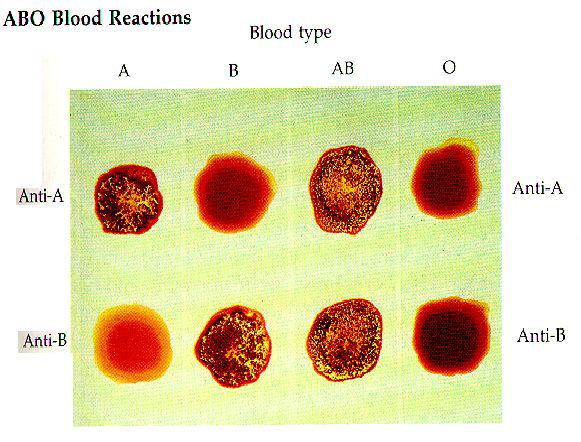Blood typing-compatibility
- font size decrease font size increase font size
 Your Blood type is a powerful genetic fingerprint that identifies you as surely as your DNA. A blood type/group is a classification of blood based on the presence or absence of inherited antigenic substances on the surface of red blood cells. These antigens may be proteins, carbohydrates, glycoproteins, or glycolipids, depending on the blood group system. A total of 30 human blood group systems are now recognized by the International Society of Blood Transfusion. The ABO and Rh systems are the most commonly used.
Your Blood type is a powerful genetic fingerprint that identifies you as surely as your DNA. A blood type/group is a classification of blood based on the presence or absence of inherited antigenic substances on the surface of red blood cells. These antigens may be proteins, carbohydrates, glycoproteins, or glycolipids, depending on the blood group system. A total of 30 human blood group systems are now recognized by the International Society of Blood Transfusion. The ABO and Rh systems are the most commonly used.
Beginning in approximately 1930, the Japanese embraced the idea of matching personality traits with one's blood type. it was believed that:
Type O:
Type O's are outgoing, and very social. They are initiators, although they don't always finish what they start. Creative and popular, they love to be the center of attention and appear very self confident.
Type A:
While outwardly calm, they have such high standards (perfectionists) that they tend to be balls of nerves on the inside. Type A's are the most artistic of the blood groups. They can be shy, are conscientious, trustworthy, and sensitive.
Type B:
Goal oriented and strong minded, type B's will start a task and continue it until completed, and completed well. Type B's are the individualists of the blood group categories and find their own way in life.
Type AB:
Type AB's are the split personalities of the blood groups. They can be both outgoing and shy, confident and timid. While responsible, too much responsibility will cause a problem. They are trustworthy and like to help others.
It is also thought that determining your Blood Type and using it as a guide for eating and living will make you healthier, slow the process of ageing and help you reach your ideal weight. This theory of 'blood type Diet' is put fourth by Peter J D'adamo in his book which premise that, type O's are the dominant-caveman type that require meat in the diet, that type A's are docile vegetarians, while B's are dairy-eating omnivores.
Do you Know your Blood group/type?
 Health care providers need to know your blood type when you get a blood transfusion or transplant, because not all blood types are compatible with each other. Blood typing is especially important during pregnancy. If the mother is found to be Rh-, the father should also be tested. If the father has Rh+ blood, when the IgG molecules (antibodies) produced by the mother pass through the placenta, they perceive fetus and fetal blood as something foreign and attack the red blood cells in the fetal circulation; the red cells are broken down and the fetus can develop reticulocytosis and anaemia.
Health care providers need to know your blood type when you get a blood transfusion or transplant, because not all blood types are compatible with each other. Blood typing is especially important during pregnancy. If the mother is found to be Rh-, the father should also be tested. If the father has Rh+ blood, when the IgG molecules (antibodies) produced by the mother pass through the placenta, they perceive fetus and fetal blood as something foreign and attack the red blood cells in the fetal circulation; the red cells are broken down and the fetus can develop reticulocytosis and anaemia.
This may hamper the normal growth and development of the fetus and have a detrimental impact on the health of a baby. In severe cases the possibility of intrauterine fetal death, miscarriages at various stages of pregnancy is high.
During the first pregnancy, conflict due to incompatibility of maternal and fetal blood for blood group and Rh factor is rare, because antibodies produced by the mother is usually not enough. But in subsequent pregnancies, the likelihood of complications increases threefold.
Most common models in which a woman becomes sensitized toward a particular antigen and starts to produce antibodies are, due to trauma, abortion, childbirth, ectopic pregnancy, ruptures in the placenta during pregnancy, or medical procedures carried out during pregnancy that breach the uterine wall and previous blood transfusions without Rh compatibility.
Avoiding or preventing the likelihood of a pathological process can be achieved by knowing the Rh blood group affiliation of father and mother. If mom and dad have Rh-negative blood, then all the children of this couple will be Rh-negative. But in cases where father has Rh-positive blood and mother's Rh-negative, the fetal Rh-probable membership is 50% to 50%. The table below explains more clearly:
Rhesus Factor
|
Father |
Mother |
child |
probability of conflict |
|
+ |
+ |
+ |
absent |
|
+ |
- |
50% + |
high possibility of conflict |
|
- |
+ |
50% - |
absent |
|
- |
- |
- |
absent |
Blood Group
|
Father |
Mother |
Child |
Probability of Conflict |
|
0 (1) |
0 (1) |
0 (1) |
none |
|
0 (1) |
А (2) |
0(1) or А(2) |
none |
|
0 (1) |
В (3) |
0(1) or В(3) |
none |
|
0 (1) |
АВ (4) |
А(2) or В(3) |
none |
|
А (2) |
0 (1) |
0(1) or А(2) |
50% probability |
|
А (2) |
А (2) |
0(1) or А(2) |
none |
|
А (2) |
В (3) |
(0(1) or А(2), or В(3), or АВ(4)) |
25% probability |
|
А (2) |
АВ (4) |
0(1) or А(2), or АВ(4) |
none |
|
В (3) |
0 (1) |
0(1) or В(3) |
50% probability |
|
В (3) |
А (2) |
(0(1) or А(2), or В(3), or АВ(4)) |
50% probability |
|
В (3) |
В (3) |
0(1) or В(3) |
none |
|
В (3) |
АВ (4) |
0(1) or В(3), or АВ(4) |
none |
|
АВ (4) |
0 (1) |
А(2) or В(3) |
100% probability |
|
АВ (4) |
А (2) |
0(1) orА(2), or АВ(4) |
66% probability |
|
АВ (4) |
В (3) |
0(1) or В(3), or АВ(4) |
66% probability |
|
АВ (4) |
АВ (4) |
А(2) or В(3), or АВ(4) |
none |
Women who are at high risk of conflict during pregnancy, should be under the careful supervision of an obstetrician-gynecologist. The gynecologist will determine the level of Rh-antibodies in the blood throughout (once per month up to 32 weeks' gestation, 2 times a month from 32 to 35 weeks and then weekly). The levels of antibody titer help determine the condition of the fetus, predict the severity of problems of the newborn, and if necessary take measures to prevent complications.
Most Rh disease can be prevented by treating the mother during pregnancy or within 72 hours after childbirth. The mother has an intramuscular injection of Rho(D) Immune Globulin. This is done so that the fetal Rhesus D positive erythrocytes are destroyed before her immune system can discover them. This is passive immunity and the effect of the immunity will wear off after about 4 to 6 weeks as the anti-Rh antibodies gradually decline to zero in the maternal blood.
In most countries, all Rhesus D negative pregnant women are given an anti-RhD IgG immunoglobulin injection at about 28 weeks gestation with or without a booster at 34 weeks gestation, as a part of antenatal care.
If you are unaware of your blood type, go get tested today. No special preparation is necessary for this test.
